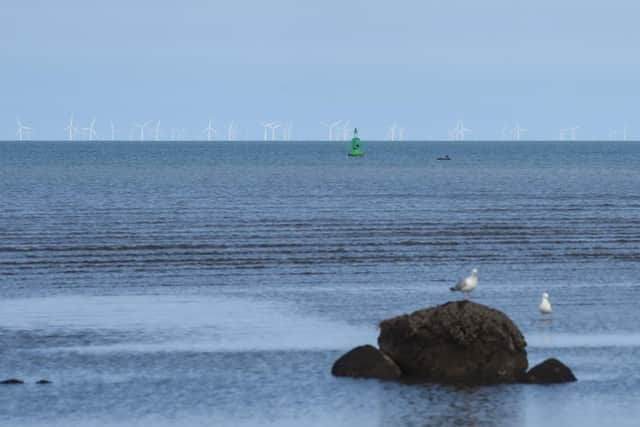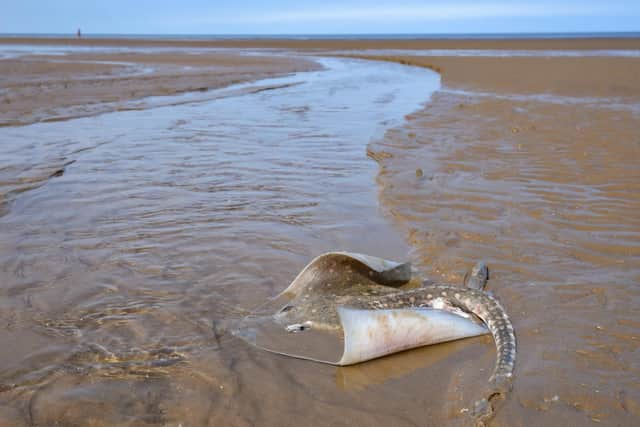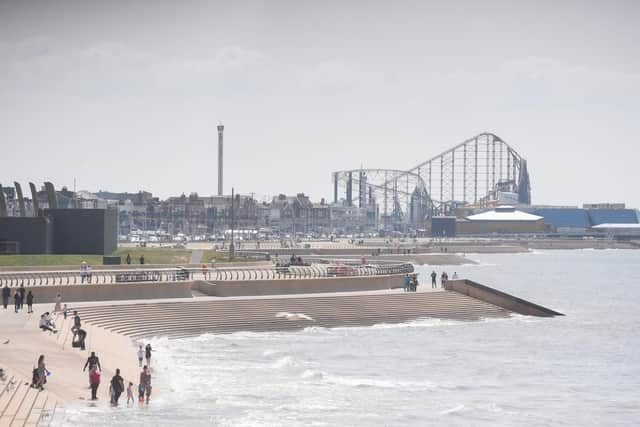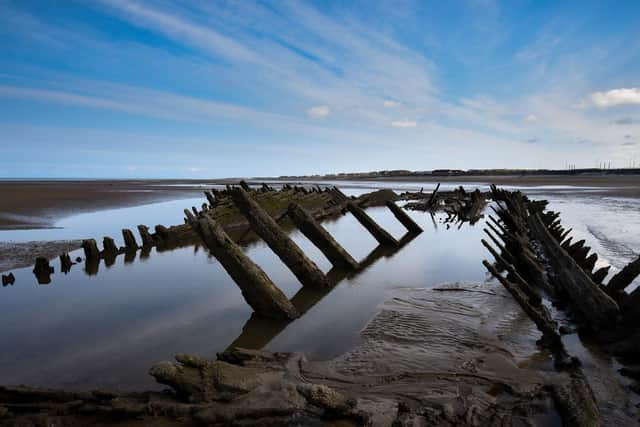Covid scuppers Blackpool's Blue Flag bid - but its clean water still brings promise to marine life
and live on Freeview channel 276
Back in 2019, Blackpool lost the internationally-recognised Blue Flag award for its south beach opposite the Pleasure Beach, which was attributed to a 1.89 per cent drop in water quality.
The council aimed to go for gold again last year, confident in its abilities to put Bispham beach - which is classified as "excellent" bathing water quality by the Environment Agency - back on the Blue Flag map.
Advertisement
Hide AdAdvertisement
Hide AdBut the impossibility of offering and promoting environment education to resort adults and youngsters during the pandemic forced a delay.
A council spokesman said: “In order to apply for a Blue Flag a number of criteria has to be met across four categories. In Bispham our bathing water is classed as excellent and we would meet the vast majority of the required standards but unfortunately this year we know we would not be able to fulfil the Environmental Education and Information criteria.
“This would require us to offer and promote environmental education activities to beach users which we aren’t in a position to do at the moment. Through LoveMyBeach we will continue to work towards this but it just hasn’t been possible this year due to the pandemic.”
Despite this setback, many of the Fylde coast's beaches, including Blackpool South, Central, North and Bispham, did scoop a Seaside Award in 2021.
Advertisement
Hide AdAdvertisement
Hide AdIn Wyre, Rossall Beach, Jubilee Beach in Cleveleys, Marine Beach and Ferry Beach in Fleetwood also received the accolade, as did St Annes Pier. in Fylde.


Seaside Awards are given to beaches acknowledged by environment charity Keep Britain Tidy as having appropriate water quality, clean beaches, and adequate safety services including lifeguards, among other factors.
Water improvements have been prioritised in Blackpool in recent years - with the installation of pumping stations across the resort to clean up the Irish Sea.
United Utilities spent five years building an underwater storage tank and a new storm water pumping station as part of an £80 million project at Anchorsholme Park, and a £35 million project to update an 80-year-old waterworks system which had been struggling to cope during times of heavy rainfall was installed on land off Midgeland Road.
Advertisement
Hide AdAdvertisement
Hide AdNew pipes were laid under routes including Highfield Road and Midgeland Road, existing pumping stations including Lennox Gate were upgraded and an underground holding tank was built at Fishers Field to capture stormwater.


The projects were undertaken in a bid to ensure sewage systems weren't overrun with rain water - and are hoped to prevent waste water being expelled into the sea, posing a serious risk to the health of marine and human life.
In fact, the cleanliness of our waters appears to be one of the contributing factors in helping marine life thrive off our coast, one expert said.
A video which emerged on social media last week appeared to show a school of bottlenose dolphins swimming off the coast at Starr Gate, a sight which is more common than perhaps most people think.
Advertisement
Hide AdAdvertisement
Hide AdAnd if scientists' predictions are correct, we could be welcoming larger numbers of another mammal, the grey seal, to our coast in coming years.


Dr Emily Baxter, senior marine conservation officer at North West Wildlife Trusts, said a reduction in pollution and improvement in water quality over the past few years could have played a role in increased sightings of cetaceans - marine mammals - off the Fylde coast.
She said: "Dolphin and porpoise sightings (and even whales) have been a regular occurrence in the summer months off Blackpool for at least the past 10 years. There are however, well known hotspots for marine mammals and basking sharks, particularly off the North Wales coast and around the Isle of Man.
"This is due to how weather systems interact with the seabed causing areas of cold, nutrient-rich ‘upwellings’ that stimulate plankton blooms and then fish, birds and marine mammals soon follow. These areas are close to the coast of the North West and Liverpool Bay so when conditions are right, they can be seen feeding close to our shores as well.
Advertisement
Hide AdAdvertisement
Hide Ad"There have also been improvements in water quality and reduction in pollution over the past few decades, which are bound to have helped."
In the past decade, the grey seal population around Walney Island, north of Morecambe Bay, has boomed five-fold - meaning there is a likelihood of more seals appearing to eagle-eyed coast watchers across the resort.
"We have seen a dramatic increase in the numbers of grey seals using the South Walney Nature Reserve increasing five-fold in the past 10 years," Dr Baxter continued.


"They also started breeding on the nature reserve five years ago and we have had pups every year since. This will mean that more seals are likely to be spotted off the Lancashire coast as they travel to feed."
Advertisement
Hide AdAdvertisement
Hide AdAccording to the Cetacean Strandings Investigation Programme (CSIP), which logs all reports of stranded mammals on UK coastlines, a significant drop in reports was received last year - which could be because lockdown was imposed and fewer people were visiting beaches.
However, a decline in numbers since 2017 held promise for populations of marine mammals, as potentially fewer of them were washing up on our shores.
In 2017, 27 dead mammals, predominantly harbour porpoises, were reported to the authority - dropping down to 22 a year later, 19 in 2019 and just 11 last year.
A spokesman for the CSIP said: "There are many reasons why strandings can happen, and most animals we see have been stranded after dying of natural causes.
Advertisement
Hide AdAdvertisement
Hide Ad"Recording strandings allows us to monitor for natural threats like disease and predation as well as human threats like pollutants and fishing bycatch. It also provides a great opportunity to study animals that are otherwise difficult to observe as they live out at sea."
Although declining, strandings still occur on beaches, albeit usually due to "natural causes."
A thornback ray was found stranded on Blackpool's central beach this week, alongside a dogfish - a small species of shark.
Thornback ray populations are commonly found off the Fylde coast, and during the summer hundreds of their egg cases - known as "mermaid's purses" - can be found scattered along the tideline.
Advertisement
Hide AdAdvertisement
Hide AdScott Blacker from Blackpool Sea Life Centre said rays are commonly found swimming around our coast - but their numbers are near-threatened due to fishing or habitat loss.
He said: "We do tend to find these washed up on the beach this time of year and I have seen a couple myself whilst out walking both at St Anne’s and Cleveleys beach.
"The rays may be coming into shallower waters to chase more abundant foods and also for breeding. They are caught a lot by anglers and fishing boats and could be thrown back as bycatch or injured when the hook is removed. The thornback ray egg case is also the most common ray egg found on the beach around here, so we know they have some large groups off the coast.
"They are listed as near threatened on the International Union for Conservation of Nature red list, and this is mainly due to habitat loss and over-fishing."